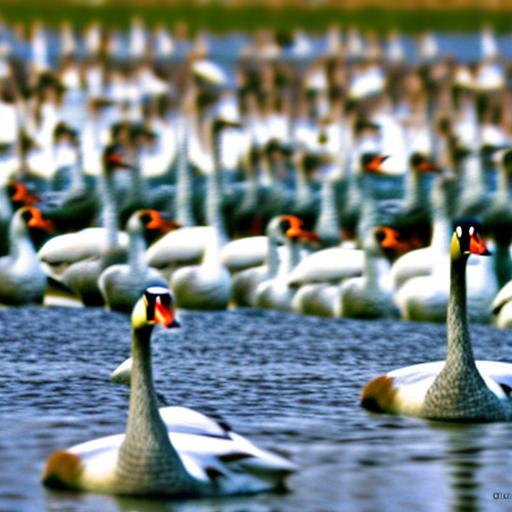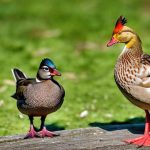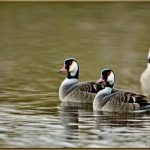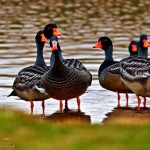Using swans as a natural deterrent for geese is an effective and environmentally friendly way to keep these birds away from your property. Geese can be a nuisance, causing damage to lawns, gardens, and other areas. Traditional methods of deterring geese often involve the use of harmful chemicals or physical barriers, which can have negative effects on the environment and other wildlife. By using swans, you can create a natural and sustainable solution to keep geese away.
Key Takeaways
- Swans can be used as a natural deterrent for geese on your property.
- Understanding the behavior of geese and how swans can help is important before introducing them.
- Using swans instead of traditional methods has many benefits, including being more environmentally friendly.
- Choosing the right breed of swan for your property is crucial for their health and success as a deterrent.
- Tips for introducing and maintaining healthy swans include creating a safe habitat and training them to patrol your property.
Understanding the behavior of geese and how swans can help
Geese are attracted to certain areas because they provide ample food sources and open spaces for nesting. They are social birds that often travel in large flocks, making them difficult to deter. Geese are also known for their aggressive behavior, especially during nesting season. They can become territorial and may attack humans or other animals that come too close to their nests.
Swans, on the other hand, are known for their intimidating presence. They are larger than geese and have a more aggressive demeanor. Swans will often chase away geese from their territory, making them an effective deterrent. The sight of a swan can be enough to discourage geese from staying in the area.
The benefits of using swans instead of traditional methods to keep geese away
Using swans as a natural deterrent for geese has several advantages over traditional methods. First, swans are highly effective at keeping geese away. Their size and aggressive behavior make them a formidable opponent for geese, who will often choose to avoid confrontation and find another location.
Compared to other methods such as noise makers or fake predators, swans provide a more long-term solution. Noise makers may scare geese away temporarily, but they will eventually become accustomed to the sound and return. Fake predators may work initially, but geese will quickly realize that they pose no real threat. Swans, on the other hand, are a constant presence and will continue to patrol the area, keeping geese at bay.
Using swans as a natural deterrent also has environmental benefits. Harmful chemicals used to deter geese can have negative effects on the environment and other wildlife. Physical barriers such as fences or netting can disrupt the natural flow of water and may harm other animals. By using swans, you can maintain a healthy and balanced ecosystem while effectively deterring geese.
Choosing the right breed of swan for your property
When choosing swans to deter geese, it is important to consider the different breeds and their characteristics. There are several breeds of swans, each with its own unique traits. Some breeds are more aggressive and territorial, while others are more docile and friendly.
The Mute Swan is one of the most common breeds used for deterring geese. They are known for their aggressive behavior and will not hesitate to chase away geese from their territory. Mute Swans are also larger in size, which adds to their intimidating presence.
The Trumpeter Swan is another breed that can be effective at deterring geese. They are known for their loud calls and aggressive behavior. Trumpeter Swans are larger than Mute Swans and can be more intimidating to geese.
Tips for introducing swans to your property and keeping them healthy
Introducing swans to your property requires careful planning and preparation. It is important to create a suitable environment for them to thrive and ensure their health and well-being.
When introducing swans to their new environment, it is best to do so gradually. Start by providing them with a small area where they can become acclimated to their surroundings. Gradually increase the size of their enclosure as they become more comfortable.
Swans require a diet that consists mainly of aquatic vegetation, such as pondweed or water lilies. It is important to provide them with a balanced diet to ensure their health. Additionally, swans need access to clean water for bathing and grooming. Regularly clean their water source to prevent the buildup of bacteria or algae.
Creating a safe and comfortable habitat for your swans

Creating a safe and comfortable habitat for your swans is essential for their well-being. Swans require access to water for swimming, feeding, and grooming. It is important to provide them with a pond or lake that is large enough for them to move around freely.
The water source should be clean and free from pollutants. Regularly test the water quality and make any necessary adjustments to maintain optimal conditions for your swans. Provide them with plenty of aquatic vegetation for feeding and nesting.
In addition to water, swans also need access to land for resting and nesting. Create areas of vegetation or grassy patches where they can come ashore. These areas should be free from predators and provide ample space for the swans to move around.
Training your swans to patrol and protect your property from geese
Training your swans to patrol and protect your property from geese requires patience and consistency. Start by establishing boundaries for your swans and reinforcing these boundaries regularly. This will help them understand their territory and discourage geese from entering.
You can also use visual cues to reinforce their behavior. For example, place decoy geese or other bird deterrents in areas where geese are likely to gather. This will help reinforce the message that the area is off-limits.
Maintaining a balance between swans and other wildlife on your property
Maintaining a balance between swans and other wildlife on your property is important for the overall health of the ecosystem. Swans can be territorial and may chase away other birds or animals that come too close to their territory.
To maintain a balance, provide separate areas for different species. For example, create a designated nesting area for swans and provide other areas for other birds or animals. This will help prevent conflicts and ensure that all species can coexist peacefully.
Addressing concerns about using swans as a deterrent for geese
Using swans as a deterrent for geese may raise concerns about aggression towards humans or other animals. While swans can be aggressive, they are generally docile towards humans if they are not threatened or provoked.
To address concerns about aggression, it is important to establish boundaries and reinforce them regularly. Avoid approaching the swans too closely or making sudden movements that may startle them. Give them space and respect their territory.
If you have concerns about aggression towards other animals, it is best to monitor their behavior closely. If you notice any signs of aggression towards other animals, take steps to separate them and create separate areas for each species.
Conclusion and success stories of using swans to keep geese away
Using swans as a natural deterrent for geese is an effective and environmentally friendly solution. Swans are highly effective at keeping geese away and provide a long-term solution compared to traditional methods. They also have environmental benefits and help maintain a healthy ecosystem.
There have been many success stories of people using swans to keep geese away. These stories highlight the effectiveness of using natural methods and the positive impact it can have on the environment. By considering the use of swans as a natural deterrent, you can effectively keep geese away while maintaining a balanced ecosystem on your property.
If you’re looking for effective ways to keep geese away from your property, you might be interested in an article on Poultry Wizard that discusses using swans as a natural deterrent. Swans are known to be territorial and can help keep geese at bay. To learn more about this method, check out the article on Poultry Wizard. Additionally, if you’re interested in breeding geese and caring for goslings, there’s a helpful guide available at Poultry Wizard. For those who are into chicken keeping, you might also want to explore the unique and stylish Hannah Montana Chicken Coop featured on Poultry Wizard.
FAQs
What is the article about?
The article is about using swans to keep geese away.
Why do people want to keep geese away?
Geese can cause damage to property, create a mess with their droppings, and be aggressive towards humans.
How do swans keep geese away?
Swans are territorial and will defend their space against other waterfowl, including geese. The presence of swans can deter geese from entering an area.
Do swans harm geese?
Swans may chase and intimidate geese, but they typically do not harm them physically.
Can swans be aggressive towards humans?
Yes, swans can be aggressive towards humans if they feel threatened or if their territory is being invaded. It is important to give swans their space and not approach them too closely.
Are there any downsides to using swans to keep geese away?
Swans can be expensive to purchase and maintain, and they may not be effective in all situations. Additionally, introducing non-native species to an ecosystem can have negative impacts on the environment.
What are some alternative methods for keeping geese away?
Other methods for deterring geese include using decoys, installing fencing or netting, and using noise or visual deterrents. It is important to choose a method that is appropriate for the specific situation and environment.
Meet Walter, the feathered-friend fanatic of Florida! Nestled in the sunshine state, Walter struts through life with his feathered companions, clucking his way to happiness. With a coop that’s fancier than a five-star hotel, he’s the Don Juan of the chicken world. When he’s not teaching his hens to do the cha-cha, you’ll find him in a heated debate with his prized rooster, Sir Clucks-a-Lot. Walter’s poultry passion is no yolk; he’s the sunny-side-up guy you never knew you needed in your flock of friends!







